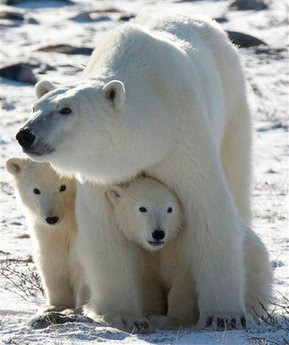
 Canadian therapist and blogger at Change Therapy Isabella Mori brings up an excellent point: "the wisdom quarterly american buddhist journal features a number of articles on climate change. while they are interesting (for example, an article on climate change in canada’s nunavut, formerly known as northwest territories, and another article on how climate change nurtures the growth of diseases) they are reprints from news services, not original articles. it would be interesting to have a commentary on the wisdom quarterly’s buddhist views of these world events (i’m thinking of the good work alexander does in this area with his commentaries from a baha’i view.)"
Canadian therapist and blogger at Change Therapy Isabella Mori brings up an excellent point: "the wisdom quarterly american buddhist journal features a number of articles on climate change. while they are interesting (for example, an article on climate change in canada’s nunavut, formerly known as northwest territories, and another article on how climate change nurtures the growth of diseases) they are reprints from news services, not original articles. it would be interesting to have a commentary on the wisdom quarterly’s buddhist views of these world events (i’m thinking of the good work alexander does in this area with his commentaries from a baha’i view.)" We're thrilled our Canadian readers are astute observers. Q: Why does WQ reprint articles? A: We want to make sure the news is out there. Q: Why does WQ not comment from a Buddhist point of view? A: Sometimes it's enough that people become aware of important issues even without comment.
We're thrilled our Canadian readers are astute observers. Q: Why does WQ reprint articles? A: We want to make sure the news is out there. Q: Why does WQ not comment from a Buddhist point of view? A: Sometimes it's enough that people become aware of important issues even without comment.  (Of course it does beg the question, How are we ever going to win a Blogisattva Award if we don't comment? Wink. How will we ever reach the commentarial heights of Blogography? How will we get a booth at Blogworld?) Here, then, is the missing commentary.
(Of course it does beg the question, How are we ever going to win a Blogisattva Award if we don't comment? Wink. How will we ever reach the commentarial heights of Blogography? How will we get a booth at Blogworld?) Here, then, is the missing commentary.
The environment is a Buddhist issue. If the personal is political, then the regional is religious.
 Implicit in all this is a valid question, "Well then what is Wisdom Quarterly's Buddhist view on the matter?"
Implicit in all this is a valid question, "Well then what is Wisdom Quarterly's Buddhist view on the matter?"
It is interesting to note that the Buddha never spoke of one's welfare and benefit without mentioning two other considerations. In addition to taking one's own health, happiness, and gain into account, the other person involved must be taken into account. Moreover, beyond that, the welfare and benefit of "both" is to be considered. Who? What is this third consideration if the first two have already been covered?

 It's possible that it's a rhetorical flourish (idiomatic Prakrit, Magadhi, Pali, Sanskrit, or whatever regional dialect the Buddha spoke in the kingdom of Magadha). More likely, however, "both" refers to the environment, community, society, the "whole," as it were. It is not enough that we benefit ourselves, which we must do but never at the expense of others. It would be worse (yes worse, not equal or better) to benefit only the other person directly involved. Martyrdom is not wisdom. Wisdom is finding a win-win angle in every situation.
It's possible that it's a rhetorical flourish (idiomatic Prakrit, Magadhi, Pali, Sanskrit, or whatever regional dialect the Buddha spoke in the kingdom of Magadha). More likely, however, "both" refers to the environment, community, society, the "whole," as it were. It is not enough that we benefit ourselves, which we must do but never at the expense of others. It would be worse (yes worse, not equal or better) to benefit only the other person directly involved. Martyrdom is not wisdom. Wisdom is finding a win-win angle in every situation.
Just as the native Americans considered seven subsequent generations in their decisions, Buddhists consider the other person directly involved AND the environment, that is, those not directly involved. "Others" means those indirectly involved, strangers in the community, the people you're not likely to meet but whom you are having an impact on.
 What we as Americans decide has an effect on far flung regions of the continent: the Nunavut in Canada feel the impact of our daily decisions. I can live with dirtier air; my neighbor may not like the sting or the fact that I'm shaving a few months off his/her life. But acid rain and Arctic warming for the Nunavut?
What we as Americans decide has an effect on far flung regions of the continent: the Nunavut in Canada feel the impact of our daily decisions. I can live with dirtier air; my neighbor may not like the sting or the fact that I'm shaving a few months off his/her life. But acid rain and Arctic warming for the Nunavut?
Taking the whole into consideration, I would do everything I could to keep our (everyone's) environment clean.
Mori was specific in asking for a little more climate change wisdom:
- what do you/i/we take from all this?
We want a sustainable environment. And by "we," we don't just mean Engaged Buddhists.
- nonduality and duality
Duality (or the idea of separation and independence from constituent conditions like the aggregates or our interdependence with others) is a pernicious misperception, a lingering distortion. Confident that we are all one -- united by our wish for happiness (or at least non-suffering), survival, and fulfillment if nothing else -- we improve and everyone else simultaneously improves whenever we take everyone into consideration. We are part of that everyone; in other words the wish "May all living beings be well and happy" always also includes us.
- the personal and the political
We coined a new phrase adding to the American-English lexicon, "The regional is religious." Personal decisions affect the body politic. Regional decisions affect religion as it is practiced. If something is a disservice to anyone, is anyone else really benefiting?
- water and ice
Clean ice is wonderful and crucial for the health of the planet; dirty water we have enough of.
- what would [the] buddha do?
The historical Buddha (Siddhartha the former Sakyan prince who abandoned the world and its disputes) would bring his neighbors together in amity, as he repeatedly attempted when the Sakyan clan was going to be massacred for having insulted a neighboring tribe in provincial ancient India, or when he attempted to settle a river water dispute, or when he cleaned up the environment after a severe famine (all good sutras to cover in the future).
- what IS [the] buddha doing?
Those formations (aggregates) by which "the Buddha" was formerly designated (though they were at all times radically impermanent, thoroughly incapable of satisfying, and void of identity) are no longer in play. Maitreya, the buddha-to-come, who now resides in a superordinate plane above the human (we hesitate to say "heaven," which is misleading) and not in southern Nepal, has something more to offer the world than recycling and environmentalism.
 But it is interesting to note that when "Buddha Boy" (aka, Ram Bahadur Bomjon or Palden Dorje) emerged from his prolonged meditation and allegedly complete fast to speak to the world, his principal concern was the state of the world: "Murder, violence, greed, anger, and temptation have made the human world a desperate place. A terrible storm has descended upon the human world. And this is carrying the world towards destruction. There is only one way to save the world and that is through Dharma (spiritual practice)." (See the WQ translation of his entire speech).
But it is interesting to note that when "Buddha Boy" (aka, Ram Bahadur Bomjon or Palden Dorje) emerged from his prolonged meditation and allegedly complete fast to speak to the world, his principal concern was the state of the world: "Murder, violence, greed, anger, and temptation have made the human world a desperate place. A terrible storm has descended upon the human world. And this is carrying the world towards destruction. There is only one way to save the world and that is through Dharma (spiritual practice)." (See the WQ translation of his entire speech).
 In closing, what we choose individually and personally does not remain private. It affects the world around us, first perhaps benefiting our immediate circles but soon extending out to encompass farflung and unseen worlds, even village life in distant Nunavut, which means "our land" but does not refer simply to the Arctic Archipelago or the human world. What would the Inuk think of our decisions or our proximate neighbors, the Dows and the Joneses, for that matter? It's something to consider.
In closing, what we choose individually and personally does not remain private. It affects the world around us, first perhaps benefiting our immediate circles but soon extending out to encompass farflung and unseen worlds, even village life in distant Nunavut, which means "our land" but does not refer simply to the Arctic Archipelago or the human world. What would the Inuk think of our decisions or our proximate neighbors, the Dows and the Joneses, for that matter? It's something to consider.
No Comment
Bank failures top 100, only part of industry woes
US swine flu deaths surpass 1,000
Iran to respond to UN nuclear proposal next week
House health care bill over $1 trillion for decade
Slain Fla. girl's mom vows to find unknown killer
Obama: "Cynical claims" attacking energy bill
































































































































































































































No comments:
Post a Comment